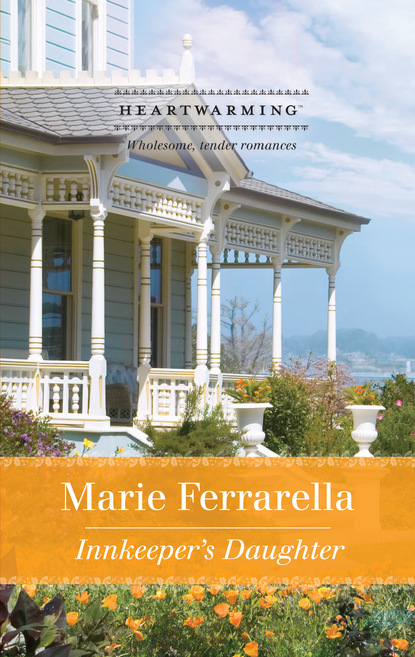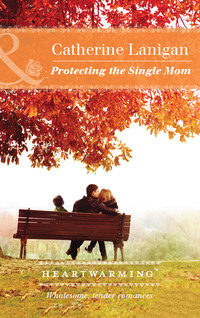
Полная версия
Love Shadows
“Did you say something, Annie?” Luke finally mumbled.
Annie’s face was pressed against the glass. “Yeah,” she said with a whisper of reverence in her voice. “That’s the house I want.”
“Me, too,” Timmy chimed, looking at his father’s mournful expression in the rearview mirror. It was like always. His father wasn’t listening to them. Half the time when he did listen, he just growled at them.
Nothing had been good for any of them since Mom had died. Timmy watched out the back window as they drove past the stucco house. I wish we could live in that exact house someday.
Timmy realized he’d been making a lot of wishes lately. He wanted a big golden retriever and he wanted a home where everyone hugged each other a lot and always smiled and never frowned as if something was wrong. Timmy didn’t think such things were impossible.
That’s what wishes are for, aren’t they? Timmy thought. To make dreams come true.
CHAPTER TWO
LUKE PARKED HIS Ford F-150 smack dab in front of Cupcakes and Coffee Café and turned off the engine. “I’m going to get a quick cup of coffee,” he said, turning to his children.
“Okay, Dad,” Annie said, unbuckling her seat belt.
“Whoa! Where do you think you’re going?” Luke asked sternly, throwing his hand over the buckle.
Annie’s eyes flew open with her customary dramatic flair. “To see the puppies. The only thing good about this whole day is that we are going to see the puppies. Right now,” she said in that intractable tone that revealed conviction without disrespect. “If we have to go to boring school all day, then we can at least see the puppies.”
Luke chewed his bottom lip thoughtfully and rubbed his scruffy, unshaven cheek.
“Please, Dad,” Timmy said earnestly.
Peering at both his children, Luke wished he didn’t see so much eagerness in their eyes. It dumbfounded him that dogs could mean so much to them. He’d told them a hundred times that they could not afford a dog. Luke was overwhelmed with all the medical bills that had piled up in the wake of Jenny’s illness and death. Luke didn’t see how he’d get them paid off even if he had a decade to do so. To make matters worse, both Luke and his boss, Jerry Mason, were very concerned about the slowdown in the construction sector. Jerry had laid off all his full-time crews and used them only on an “as-needed basis.”
Luke was the only employee left on salary, and his paycheck had gotten smaller. Still, Luke was lucky to have a full-time job. In order to make up the difference, Luke had been looking for weekend work and had cut back on extra household expenses. One of the first luxuries to be eliminated was cable and DSL. In order to use the internet to search want ads, he’d resorted to visiting the public library. So far, he’d come up empty.
Somehow, Luke had managed to keep the family afloat over the past year, even with the cutback at work. Although there was some equity in the house that would relieve most, but not all, of Jenny’s medical bills, Luke knew that if he were to sell the house, it would be like burying Jenny all over again. He couldn’t go through that kind of pain ever again. It was hard enough to live in the hollow space he called his “life” as it was. He had left the house Jenny had turned into a home for them all just as it was on the day of her death. Her clothes were still in the closet, her sweater hung over the back of the kitchen chair and the kids knew never to move it. The house was a time warp, and inside its walls, Luke could pretend that Jenny was alive.
Luke was right, he believed, to deny the kids a dog. A dog required shots and veterinarian visits. They got sick just like kids. There were bills for the groomer. Special diet foods. He knew from his friends and coworkers that owning a dog was as costly as a child, minus the education.
Scratch that. I forgot obedience school.
“You can go look as long as you remember that I’m not buying a dog.”
“We know, Dad,” Annie answered.
“Annie, you hold Timmy’s hand. Don’t go anywhere else. I’ll only be a sec.”
“Dad,” Annie said, “we just want to see the puppies. We don’t want to run away.”
Luke opened the truck door and hauled Timmy out of his car seat, which Timmy despised because it made him feel like a little kid. At least twice a week, Luke caught Timmy weighing himself, hoping he would finally pass the legal forty-pound mark so he could use an “adult” seat belt and not be treated like the little kid he was.
Annie took Timmy’s hand, and together they walked up to the bay window of Puppies and Paws, where three two-month-old golden retriever puppies played with each other. They tumbled over stuffed animals and scooted dangerously close to their water bowls, but never splashed a single drop out of the metal containers.
“I like the white one,” Annie said. “I think I’ll call her Snowball.”
“That’s a stupid name for a dog,” Timmy replied, placing his nose so close to the glass he mushed the end. “These are the best pups Grandy ever made.”
“Grandy doesn’t make the puppies, she just breeds them. There’s a difference,” Annie said, though she wasn’t quite sure why she was right. Annie just remembered that several years ago, when her mother was alive, they had come to Puppies and Paws and her mother had told her Grandy was a dog breeder.
Puppies and Paws was the best place in all of Indian Lake as far as Annie and Timmy were concerned. Grandy Ipson always had the cutest and cuddliest puppies in the window, and no matter if it was raining or snowing, there was always a new little fellow for them to watch while their dad went next door for his coffee.
“I like the red one,” Timmy said. “I’d call him Copper. That’s the right kind of name for a great dog like he’s going to grow up to be.”
Annie smiled at her little brother and slid her arm over his shoulder. She knew Timmy wanted a dog really bad.
Annie looked at the longing in Timmy’s eyes. The little red puppy was now licking the glass that Timmy had pressed his face against. The past two years had been very sad for all of them after her mother had died. Annie had often cried herself to sleep, but Timmy had started spending a lot of time by himself. Often, she saw him sitting alone on the back steps of their house, just staring off into the distance. Annie wasn’t sure if he was missing their mother or if it was because their father didn’t spend time with them like he used to. She knew she couldn’t say or do much to make up for their mother being gone, but if she could get a dog for Timmy, maybe then the heavy sadness they all felt might go away.
Right then and there, Annie promised herself that she would find a way to convince their father that dogs could be cheap.
* * *
“A DOLLAR TWENTY-FIVE? Since when?” Luke asked Maddie Strong as she handed him the paper cup of robust black coffee. “It’s always been a dollar.”
Maddie swept a palm over her short, streaked, blond hair, put her hand on her hip and leveled her sparkling green eyes at Luke. “My profit margin decreased when the property taxes went up. Heating bill is through the roof. Water jumped, too. Not to mention there was some drought in Colombia and the coffee beans are sky high. That about cover it for ya, Luke?”
Luke sucked in his cheeks to keep his laughter at bay. “Your face is red, Maddie.”
“Gets that way when I’m riled up.”
“Sorry I said anything,” he apologized, taking a sip. He smiled. “Man, that’s good.”
Maddie’s grin broke free across her face. “I aim to please.”
“You want to take a cupcake to your kids?” She leaned a bit closer and whispered so the other customers wouldn’t hear her. “Half price.”
Luke was tempted as he glanced along the back bar where Maddie kept the instruments of her creative culinary genius. Maddie had invented “Iced-to-Order” cupcakes, an Indian Lake sensation that made Cupcakes and Coffee Café a hot tourist spot all through the summer and fall.
There were six kinds of cakes today, including French vanilla, double Dutch fudge, strawberry, lemon, carrot and red velvet. Once a patron chose the cupcake base she wanted, Maddie added one of nearly a dozen different kinds of icing piped out of thick pastry tubes that hung from a gleaming stainless-steel rack along the back counter. There was chocolate ganache, vanilla butter cream, boiled white non-fat icing, cooked white flour icing, whipped cream icing, Italian wedding cake icing, lemon butter icing and strawberry almond. Luke’s mouth watered just looking at the chalkboard list of options. If he had the money, he would buy a dozen cupcakes for him and the kids. “Thanks for offering, Maddie, but the kids are on their way to school and my wife told me it’s bad for them to have sugar in the morning.”
“Good advice.”
“Maybe for a special occasion I could take you up on that offer.”
“Sure,” Maddie said.
Luke handed Maddie a single dollar bill and counted out two dimes and a nickel. “Thanks for the coffee.”
“You take care, Luke.”
“You, too, Maddie,” he said.
As Luke was coming out of Cupcakes and Coffee Café, a late-model, fire-engine red GMC Envoy screamed up to the curb and parked abruptly. Sitting shotgun was the biggest, dirtiest, happiest golden retriever Luke had ever seen.
The driver’s door flew open, and as a young blonde woman stepped out, the dog leaped over the driver’s seat and sprang onto the sidewalk.
“Look at that!” Timmy shouted with glee and pointed at the dog. Just as he raised his hand, the dog whirled his head around to see Timmy. Smiling ear to ear, if that was possible for a dog, the retriever shot over to Timmy and stood on his hind legs, placing two filthy, muddy paws on Timmy’s freshly laundered and pressed white uniform shirt.
“My God, get your dog away from my son!” Luke shouted as he rushed toward Timmy.
“Beauregard!” the woman yelled, but the dog paid no attention to her. Instead, he licked Timmy’s cheek with a long and very slobbery dog kiss.
Timmy giggled and turned his face away, only to be licked on the other cheek. “Hey, he likes me!” Timmy said, putting his arms around the dog’s chest and nearly hugging him.
Annie, not to be left out of the fun, sidled up to Timmy and stuck her face close to Beauregard’s. She, too, got a wet kiss.
Beauregard lifted a muddy paw and put it around Annie’s shoulder as if they were long-lost friends sharing a hug.
“What a great dog!” Annie exclaimed.
“Get your filthy dog off my kids, lady!” Luke bellowed as he rushed toward the scene. “I was up till midnight washing and ironing their clothes!”
* * *
SARAH FOUGHT TO grab Beau’s leash, but the man’s anger was so intense that her hands were shaking. He stomped toward her as she continued to fumble and jerk at Beau’s leash, but the dog simply would not take his paws off the two little kids.
“Lady, do something! Doesn’t your stupid dog understand commands?”
“Yes, he does,” she bit back finally, clutching at Beauregard’s collar.
The kids had their hands on Beau’s paws and were holding him in place as if they weren’t about to let them go.
The little red-haired girl looked up at Sarah with such longing in her eyes that Sarah squinted at her, wondering what kind of game these kids were playing.
“I’m so sorry,” Sarah said to the very angry father. His face was red and he looked as if he could bite her head off in one quick motion.
“Just get him off,” Luke roared.
“Beau, down. Now!” she ordered her very happy golden retriever.
“That dog should be locked up,” the tall, dark-haired man snarled at her as he tried to wipe mud off the little boy’s shirt.
“I’m so very sorry. Beauregard never does anything like this. I don’t understand what got into him.”
“I don’t need your life story. Your apology is not going to clean up my children. Now, if you want to miraculously launder their clothes so they can go to school, then I accept your apology.”
“I’ll pay.” She swallowed hard, feeling the heat of his temper bore into her from his narrowed blue eyes. “For their cleaning, I mean. Whatever it costs. I’ll even replace their uniforms, if necessary.”
The man crouched down as he wiped at the mud on the little girl’s shirt, but he only made it worse. Now the streak of mud went up over her shoulder and onto her sleeve. The girl frowned at him, but she didn’t say anything.
Sarah noticed the boy was still petting Beau’s head, seemingly unaffected by his father’s anger—as if he were used to this kind of outburst. Beau jumped up on the little boy again and the boy squealed in delight.
Sarah had to smile. “He really likes you,” she said.
“Oh, for cripe’s sake,” Luke rumbled. “Control your dog. Haven’t you heard of obedience school?”
“I said I was sorry.”
“Not good enough,” Luke bit back.
Anger and frustration uncoiled down Sarah’s spine. She hated being angry. Negative feelings served no purpose whatsoever. As far as Sarah was concerned, they caused illness and wrong-thinking. The fact that this man was upset was understandable. If she were the children’s mother she would be furious, as well. She cared that her dog was the cause of the problem, but she didn’t have time for any of this. Not today.
“I told you. Send me the cleaning bill and I’ll take care of everything.”
“Yeah, right,” the man shot back.
“I’m sorry. So very sorry,” she said again, just as Grandy opened the door.
“What’s all the ruckus out here?” the stick-thin woman wearing a rubber apron asked. “Oh,” she said, looking at the mud-covered golden retriever, “It’s you, Beau.” Grandy stepped aside just as Beauregard charged past her and dragged Sarah, still teetering in her high heels, toward the shop.
Luke looked at the puppy-shop owner and pointed accusingly at Sarah. “Because of that woman’s rudeness, I have to take my kids home so they can change, which will make them late for school and me late to work.” Luke didn’t notice Timmy’s beaming smile.
Annie was keenly aware of her father’s fury. She looked at Timmy’s happy face and nudged him with her elbow. “Cut it out,” she whispered.
Timmy squeezed his mouth into a pucker and hung his head.
“People like that shouldn’t be allowed to own a dog if they can’t control them,” Luke said, looking at Timmy and Annie. He snapped his fingers. “In the truck. Now. March!”
“It’s okay, Dad,” Timmy said, climbing into the truck. “The mud will dry.”
“And I’ll explain everything to his teacher,” Annie offered. “It was just an accident.”
Annie buckled herself in and smiled winningly at her father.
Luke growled under his breath, banged the steering wheel with his fist and stifled a string of curses that threatened to explode from his mouth. He turned on the ignition and said, “This is precisely the kind of thing that confirms my feelings about dogs and kids.”
“What’s that?” Annie asked.
“The two don’t mix.”
Timmy looked back at the puppies in the window. The little one he’d liked so much was standing on his hind legs with his paws on the windowpane, watching them leave. Timmy felt as if a heavy stone was sinking in his chest. He just knew that little fellow would be a beautiful, great big dog someday like Beauregard, and when he was all grown up, he was going to have a dog just like that.
* * *
LUKE DROPPED THE children off at St. Mark’s School, kissed them each goodbye and waited until they were in the building before leaving.
He drove back up Maple Avenue and then across Main Street and headed north toward the construction office where he worked.
It wasn’t until he was on Indian Lake Drive, which rimmed the north shore of Indian Lake, that he realized his eyes were filled with tears. He pinched them away with his thumb and forefinger. He guessed he was so used to tears now that when they came, he was numb to their presence.
He pulled into the gravel drive of the metal-sided and tin-roofed construction office. Luke threw back the last gulp of his coffee.
Getting out of the truck, he didn’t notice the enormous flowering crab-apple tree he’d parked beneath, nor the blanket of pink petals under his truck’s tires. He didn’t notice the warm spring breeze or the scent of purple French lilacs that formed a screen along the chain-link fence that separated the parking lot from the lumberyard next door.
Luke didn’t notice much of any of the beauty around him. All he knew was that he had to face another day of his life without his wife and without the only love he would ever know.
CHAPTER THREE
AFTER MAKING CERTAIN that Beauregard was settled in Grandy’s competent and loving hands, Sarah drove toward her office, which sat on a hill across Indian Lake Drive, offering a spectacular view of the lake.
As much as she needed to rehearse her presentation to Charmaine, Sarah’s thoughts tripped back to her encounter with the sharp-tempered, currish man she’d met that morning.
Granted, Beau had ruined his kids’ clothes, but that wasn’t cause enough for him to be so uncivil toward her. She was at fault for not controlling the normally well-behaved Beau, but today he’d been anything but her respectful, intelligent canine companion.
She had to admit Beau’s friendly nature had probably ruined the man’s morning as much as it had hers.
Can’t say that I blame the guy for being angry. But why would he be up late at night doing laundry?
Sarah stopped at the light on Willow Lane and tapped her fingernail against the steering wheel. Then she smacked her forehead. He’s a single dad! Divorced. That’s it.
The light changed.
His wife probably left him because he clearly doesn’t like dogs, not to mention that he’s a snarling grouch. What kind of person doesn’t like dogs? Sarah chewed her lip and watched the light turn green. She depressed the gas pedal. Certainly not any kind of person I would want to know.
As she made her way through town, she looked up at the flowering white almond trees lining both sides of Main Street and thought of her mother.
It was impossible for any of the townsfolk not to think of Ann Marie Jensen when they looked at the beautification projects around Indian Lake. In the past twenty-five years, Ann Marie had been almost solely responsible for the changes that gave Indian Lake its charming, nearly enchanting present look. She’d spent twenty years as a member of the Zoning and Planning Commission, during which time she’d instituted the Downtown Beautification Committee. In the early 1980s, the nostalgia for the forties and fifties that had accompanied the soda fountains, drive-in root beer stands, bike shops, record stores where customers listened to their 45s before they bought them, knitting shops and ladies’ glove shops had died. Factory jobs moved overseas, and Indian Lake manufacturing companies shut down. Younger people moved away. Neglect and disuse settled in. The town looked sad, lonely and unwanted, which it was.
Then Ann Marie moved to town, the new bride of Paul Jensen. She was more than a spark of creativity and new life. She was the firestorm Indian Lake needed to ignite the enthusiasm the town fathers had lost and nearly forgotten. She prodded, cajoled and reasoned with politicians and officials until she got the green light she wanted on whichever beautification project she felt the town could not last another day without. “No” was a concept she did not understand. Rarely did Ann Marie reject anyone or any request made of her. She worked long hours—too long, in many cases—for her town and her church. She loved both with all her being.
Ultimately, Sarah believed, her mother’s passion for Indian Lake led to her death.
Ann Marie was so used to working hard and sustaining her energy over long periods of time that she seldom slept. The doctors said her lack of rest led to a suppressed immune system. It was Sarah’s belief that the decades of putting her family and community ahead of her own health contributed to the cancer that took her life.
Sarah glanced over at the new bay window on Bechinski’s Pharmacy, another of her mother’s creative suggestions to one of the town retailers. The storefront, with its new, red, wooden door, floated in front of her on a sea of tears.
Exhaling the lump in her throat, she wiped her cheeks.
“Looks great,” she said aloud and gave a little wave.
Everything along Main Street looked amazing, thanks to Ann Marie.
One of the reasons tourists flooded to the area in summer and on warm, golden autumn weekends was that time seemed to stand still in Indian Lake. Down Maple Avenue, where Sarah lived, people still sat in wicker rocking chairs on the front porches of their elegant Victorian and Edwardian-style homes in the summer and waved to people as they drove or walked past. They took time to speak to their neighbors as they went in and out of their homes in the winter. They shoveled each other’s walks, and they brought a fresh-baked pie when someone died. They cut flowers out of their gardens for each other when news of an illness traveled through the neighborhood grapevine—which was usually perpetuated by Helen Knowland or, to a lesser extent, Mrs. Beabots. Indian Lake was a place where people cared about each other. Sometimes, that caring morphed into being a busybody, but such extravagances of eccentricity were forgiven by the locals. Outsiders or those new to the area didn’t understand. They never would, either. That was why they remained outsiders. It took heart to be a part of Indian Lake, and a great deal of courage, determination and persistence. Sarah knew her mother was Indian Lake at its best.
* * *
SARAH PARKED HER car in her assigned space, gathered her portfolio and purse and exited the car. She went around to the front of the building and entered through the double glass doors.
Just walking into the reception area of Environ-Tech Design still gave her chills of pride after almost two years. Charmaine Chalmers had carefully laid out the space with the expertise of one of the most illustrious Black Hat Feng Shui Masters in Chicago. The serenity and peace that clients felt walking in the doors was planned, purposeful and dramatic. It was a breath of urban class in a small town, and Sarah loved it. The walls were painted a burned taupe with glistening white crown molding and trim. The floor was bamboo hardwood covered with ancient Persian rugs in muted browns, reds and golds that looked as if they had been dragged through the Sahara to gain their patina. Tall African jars held white bird-of-paradise stalks that Sarah knew attracted aphids like crazy, but Charmaine spritzed the leaves with soapy water and wiped them down one by one on Saturday nights when she had nowhere else to go.
The conversation area was centered with an ink-black mahogany coffee table that glistened like glass and had never once been allowed to display the first fingerprint or speck of dust. The front-desk receptionist, Lou Ann Hamilton, made certain that Charmaine’s specially manufactured and painstakingly imported Samoan table was pristine at all times.
The Asian-inspired seating was actually Italian in design and constructed south of Milan, but no one in the office was allowed to give out the name of Charmaine’s highly talented, grossly underpaid furniture designer. Charles Vesa was fifty years old, divorced, and other than when he wandered into the Environ-Tech offices unannounced with rolls of design paper under his arm, few people ever saw the man. When Charles showed up, Charmaine always dropped everything she was doing, sat in her conference room and studied his drawings as if they were bits of the Dead Sea Scrolls.
Sarah went into her cubby-hole-size office, which was only slightly larger than the other offices up and down the hallway. The building, built before the First World War, still had interior doors with walnut bottoms and frosted, “pebbled” glass on the upper half of the door. No one could see in or out. It seemed rather odd to Sarah that, despite Charmaine’s intense desire to create a Feng Shui atmosphere in the front of the office and the conference room, the rest of the building felt like the back rooms of an old county recorder’s office. The offices were certainly not conducive to creative thought.












